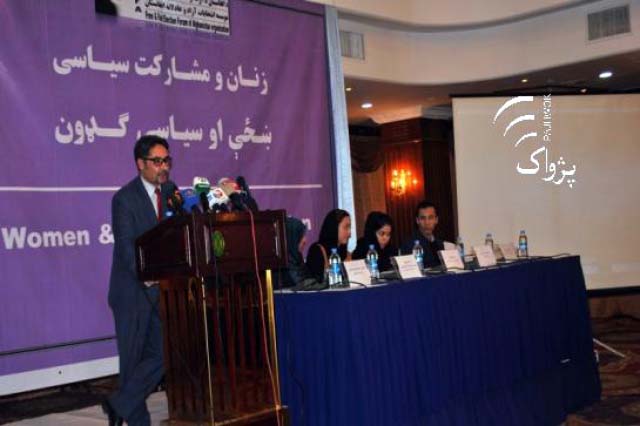KABUL - The Free and Fair Election Foundation of Afghanistan (FEFA) on Wednesday expressed concern over a weak presence of the women in government job nominations and in diplomatic missions, asking the government to announce a programme for introducing and selecting females for key public sector jobs.
Naim Asghari, FEFA’s programmes director, told a news conference in Kabul his organisation had recently conducted a survey on women’s political participation in Afghanistan.
As part of the survey, 233 women working with civil society groups, election commissions, political parties, provincial councils, the Ministry of Interior, the Afghanistan Independent Human Rights Commission (AIHRC) and women’s affairs provincial departments and education departments were interviewed.
Asghari said electoral fraud, lack awareness about political process, the shortage of female police for security of polling stations, economic problems and insecurity were cited the main causes behind the weakened participation of women in political process.
But he also acknowledged government’s efforts at improving the women’s role in government and hailed the appointment of two female governors for Ghor and Daikundi provinces, three female ministers and heads of provincial women’s affairs departments.
However, Asghari said the overall presence of women in selective and diplomatic posts had been low.
“There are only two female governors in 34 provinces. We have only one female ambassador in 41 embassies and 24 consulates and one female district chief in 365 districts and no female mayor in 153 municipalities,” he said.
He said the presence of women on elected posts was many times high than selective posts. He said 27 percent of Wolesi Jirga members, nine percent of Meshrano Jirga and 20 percent of provincial councils were females.
The FEFA report expressed concern about the rejection of a female nominee for the High Council of Supreme Court by the Wolesi Jirga and said it had been expected the government would again nominate a female, but it did not do so.
FEFA findings show a very low presence of women in election institutes and in the Independent Commission for Overseeing the Implementation of the Constitution (ICOIC). Only two of 14 members of the Electoral Reform Commission (ERC) were females and one woman among six members of the ICOIC.
Masuda Karokhi, Wolesi Jirga and FEFA member, said women’s participation in the government could be increased if the rules of democracy were respected.
She also provided some suggestions how to increase women’s partnership in key government departments. (Pajhwok)

